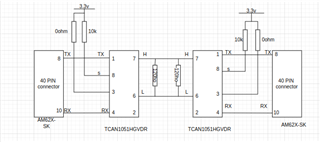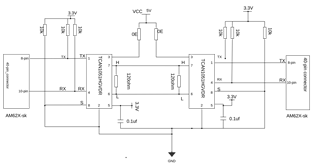Part Number: PROCESSOR-SDK-AM62X
Other Parts Discussed in Thread: TCAN1051, SK-AM62
Hi TI,
We are testing the CAN interface (MAIN_DOMAIN MCAN0)on the Am62x starter Kit.
We have a CAN transceiver (TCAN1051HGVDR) which is externally connected to the 40 Pin connector. (Pin 8(E15) and Pin 10 (C15)).
We have made the connections as per the link below.
But the problem is after flashing the Am62x-base.wic Image to the SD Card, I can't able to see any Overlay (k3-am625-sk-mcan.dtbo) file in the root(root folder).
In the latest release of SDK ti-processor-sdk-linux-am62xx-evm-08.05.00.21-Linux-x86, we have Overlay file for CAN in this path(arch/arm64/boot/dts/ti/k3-am625-sk-mcan.dts).
Do i need to convert this file to .dtbo and place it inside the root folder to test the CAN Interface. (Any procedure to convert the dts file to .dtbo).
or Do I need to include the k3-am625-sk-mcan.dts file inside the k3-am625-sk.dts file and create a dtb.
kindly guide me through this, how to proceed the testing on CAN Interface.
Regards,
Murali Chikkanna



